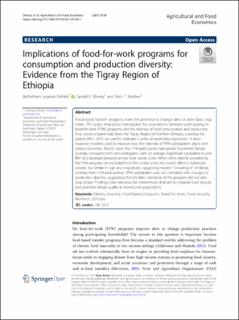Implications of food-for-work programs for consumption and production diversity: Evidence from the Tigray Region of Ethiopia
Peer reviewed, Journal article
Published version
Permanent lenke
https://hdl.handle.net/11250/2981338Utgivelsesdato
2021Metadata
Vis full innførselSamlinger
Originalversjon
Agricultural and Food Economics (Agric. food econ.). 2021, 9 (28), 1-24. 10.1186/s40100-021-00189-1Sammendrag
Food-based transfer programs have the potential to change diets or alter basic crop mixes. This study empirically investigates the associations between participating in food-for-work (FFW) programs and the diversity of food consumption and production. Four waves of panel data from the Tigray Region of Northern Ethiopia, covering the period 2001–2010, are used to estimate a series of panel data regressions. A dose-response model is used to measure how the intensity of FFW participation aligns with dietary outcomes. Results show that FFW participants had greater household dietary diversity compared with non-participants, with an average magnitude equivalent to one-fifth of a standard deviation in the food variety score. When items directly provided by the FFW program are excluded from the variety score, the overall effect is statistically weaker, but similar in sign and magnitude, suggesting modest “crowding in” of dietary diversity from FFW participation. FFW participation was not correlated with changes in production diversity, suggesting that the labor demands of the program did not alter crop choice. Findings have relevance for interventions that aim to improve food security and promote dietary quality in low-income populations.
